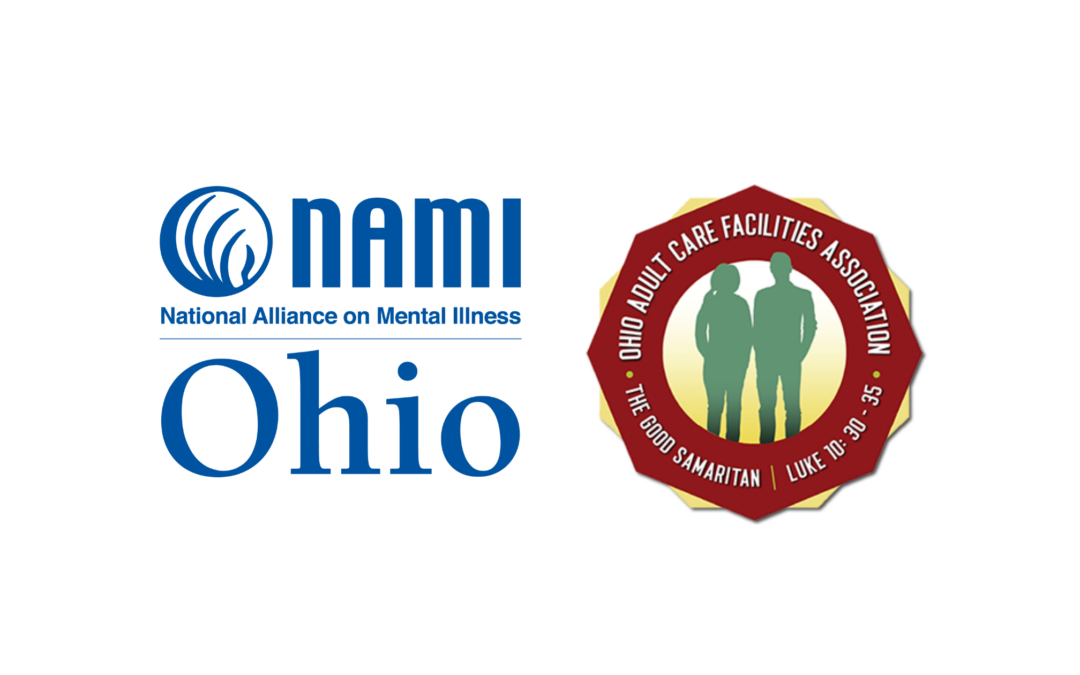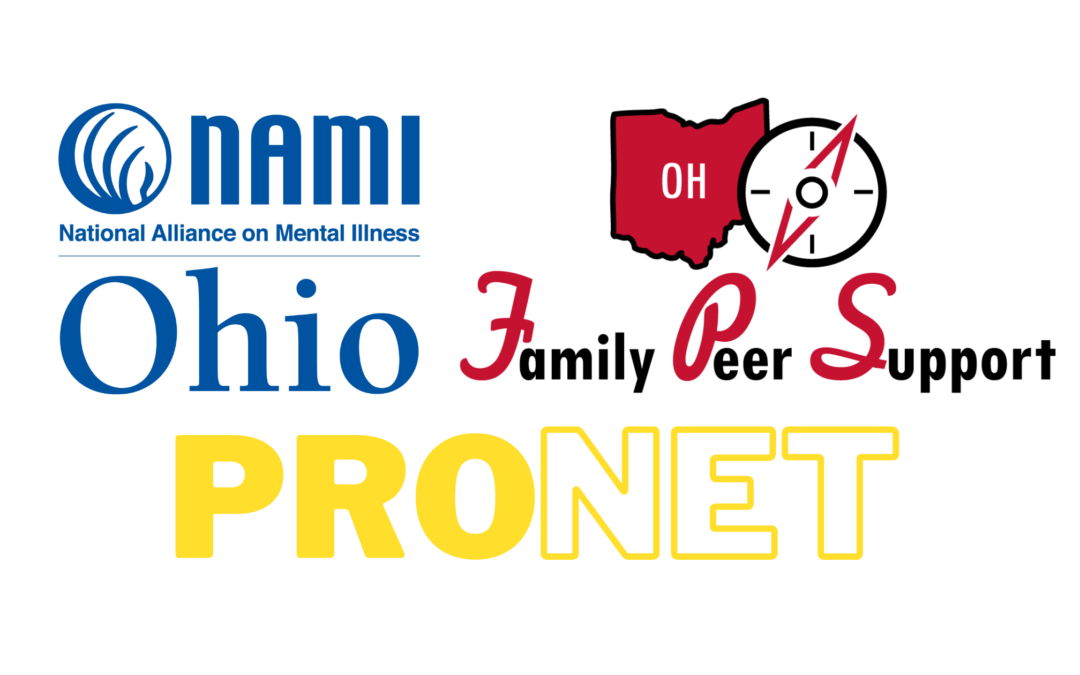
by NAMI Ohio | Apr 10, 2024 | News & Updates
Informational Session Announcement
Thanks to the generous support of the Ohio Department of Development Housing Trust Fund, NAMI Ohio and the Ohio Adult Care Facilities Association is excited to announce its 2024 Housing Institute for the development of Residential Facilities Class 2 (aka Adult Care Facilities) in Ohio. This training series is designed for teams seeking to develop and navigate the complex process of securing funding to develop new Residential Facilities Class 2 for adults (age 18 and older) living with severe and persistent mental illnesses.
Organizations interested in creating Residential Facilities Class 2 housing for the following priority populations are encouraged to apply:
- persons experiencing SPMI,
- persons who are identified as needing Residential Facilities by the local Mental Health and Addiction Services Boards or community mental health providers,
- persons at risk of long-term homelessness with behavioral health challenges exiting incarceration and/or trafficking and exploitation,
- And persons with behavioral health challenges leading to hospitalizations
The Housing Institute will help teams build their knowledge base and understand the necessary funding and long-term commitments necessary to create quality Residential Facilities Class 2. The Institute offers comprehensive training and capacity building that helps non-profit organizations move from concept stage to competitive funding applications. This significantly reduces the lead-time for development and strengthens state and local experience and capacity to create future developments. This training is also expected to reduce the time it takes to obtain funding by improving the planning and development process and planning for sustainability.
The 2024 Housing Institute will be held both in person in Columbus, Ohio and remotely (on alternating weeks). Teams will receive 50 hours of training, including individualized technical assistance and resources to assist in completing their project. In addition, experts from across the state, including staff from NAMI Ohio and local partners, will provide insight on management, best practices, financing, and building design.
Eligible Teams
Eligible teams should include a designated team leader, a housing development/owner partner, a service provider partner/a partner to oversee daily operations. The designated team leader may be the development/owner, or service partner. Developers must have experience with developing housing for specialized populations. Teams must have at least three members.
The Housing Institute will require
- 50 hours of interactive training both in person (in Columbus, Ohio) and virtually
- Teamwork outside of the designated training dates and times.
- Note: Teams should find time to meet in between sessions to work on milestones. Those dates and times are established by the teams and coordinated by the teams.
- Attendance at ALL training sessions
- Meeting milestones as a team
- Being prepared to present your final project to a funder’s panel
- Commitment to taking project concept from idea to completion with the goal of having a 12-16 bed Residential Facility Class 2 opened
- If funded, the ability to maintain project for 15 years after development
- A team member that will be the non-profit property owner
Participation in the Institute is not a guarantee of funding from NAMI Ohio, OACFA or any other sources.
To learn more about the 2024 Housing Institute, the commitment, requirements and to request an application you must attend one informational session.
TO REGISTER
April 17,2024 at 1:30pm
https://events.teams.microsoft.com/event/56033147-61c7-482c-ba12-92eb8bebe0a8@f7123256-0161-4b46-8296-a342336a6a5e
OR
April 19,2024 at 11:00am
https://events.teams.microsoft.com/event/50005044-ae4a-45b2-84d9-4b318d8a44d0@f7123256-0161-4b46-8296-a342336a6a5e

by NAMI Ohio | Mar 12, 2024 | News & Updates
NAMI Ohio is excited to introduce you to our new learning community for professional development, NAMI Ohio FPS ProNet. Our community is designed to provide a platform for Family Peer Supporters and system partners to share their knowledge, learn from each other, and grow together.
Our community will meet on the 4th Friday of each month. The first meeting will offer technical assistance on recertification. The Zoom link will be available on Basecamp.
This community is open to any Family Peer Supporter (and others interested in family support) and are passionate about learning and development. This is a safe space to share our knowledge and experiences to create a supportive and collaborative environment that fosters growth and development.
NAMI Ohio will strive to highlight a wide range of resources available to Family Peer Supporters, including online courses, webinars, and workshops. The community will also be a great place to network with other Family Peer Supporters and to stay up to date with the latest trends and best practices.
Participants in the learning community will be eligible for a Certificate of Participation which can be used towards your Ohio Family Peer Support recertification.
Join our community and become a part of this exciting new initiative.
This Month:
NAMI Ohio Professional Network: Postvention Support: What does that mean? How do I find it for the families I serve?
April 26, 2024 12pm-1pm
“Suicide”. The word means many things for many different people. Stigma may prevent some from even saying the word, while others may immediately feel pain when they see the word. We are all aware of prevention and awareness when it comes to suicide, but what about postvention services?
This training will address:
- Understanding the language of suicide, why these changes are important, and how they reduce stigma.
- Defining and identifying examples of postvention services.
- Exploring tools to locate those services when the family you serve experiences a suicide loss.
- Best practices for supporting the family you serve after a suicide loss- both for the family and for yourself.
Please note: Self-care is important. This presentation will be provided in a manner that respects the delicate balance of addressing suicide when survivors of suicide loss may also be in the audience. If you need additional support, please call 988 or ask for assistance in the chat before training ends.
This training will be presented by Amy Zell, founder of Trumbull County LOSS, a program of the 501c3 nonprofit Grief and Loss In Motion and Maker:Grief makerspace programming.
JOIN ZOOM

by NAMI Ohio | Feb 14, 2024 | Uncategorized
Written By: Alan Johnson, NAMI Ohio
The NAMI Ohio Helpline received 3,193 contacts in calendar year 2023. This is just the second year since the Helpline was upgraded in 2022 under the direction of NAMI Ohio of Client Navigator Danielle Smart, a trained and experienced social worker with master’s and bachelor’s degrees from The Ohio State University.
The Helpline can be accessed toll-free by phone at 800 286-2646 or individuals can utilize the live chat feature available on Facebook and at namiohio.com. Calls and messages are answered live during business hours and transferred to an answering service during off-hours for follow-up the next day.
Of the 3,193 contacts to the Helpline last year, 1,971 were by telephone, 664 were through the NAMI Ohio website, and 130 through email. 323 after-hours calls were received.
Nearly half the callers contacted the Helpline about themselves, although many called with concerns about a child, spouse, parent or friend. Some callers were referred to NAMI by other organizations.
Danielle said, as in the past, the prime reason people called was for direct mental health services, followed by crisis services, multiple needs, housing, legal issues, client’s rights, education, education and employment concerns.
While Danielle is the main point of contact as Client Navigator, she works with NAMI staff members and a statewide network of affiliates who are committed to removing barriers to care by identifying critical resources for individuals and families, assessing needs of callers to NAMI Ohio’s crisis line, and doing follow-ups to see that needed help is being received from local providers and support services.
Helpline callers can provide as much or as little information as they feel comfortable giving. The length of the call depends on the needs of the caller.
“Sometimes they just need to talk,” Danielle said previously. “Some of the toughest calls are talking to a parent whose child is going through a mental health crisis. I spend as much time as I need to.”
Calls came from all over the state, as well as outside Ohio. The top counties in terms of contacts were Franklin (523), Cuyahoga (136), Montgomery (61), Hamilton (49), and Delaware (39)

by NAMI Ohio | Feb 14, 2024 | News & Updates
I hope everyone is off to a great 2024. Each New Year is an opportunity to evaluate, reassess, and commit our time and energy to the grow and make this world a better place. Being on the fiscal year calendar of July 1 – June 30, it is easier at NAMI Ohio to do this in June and July. But I still like to take this midyear time to evaluate our priorities to ensure we are serving the individuals and families we represent and staying focused on the mission. Our core work is education, support, and advocacy. We do this through our alliance of 38 Affiliates and ensuring local communities have the tools needed to help individuals with serious mental illness and their families. NAMI Ohio’s education and advocacy extends to individuals and families, to the local decision-makers, elected officials, and those leading and providing services to those we love in each community throughout Ohio.
My role is to ask the tough questions: are we educating and navigating people in crisis and answering their calls; are we supporting individuals by providing quality peer and family groups; are we reaching more young people and diverse people groups with educational programs; are we advocating for and helping to develop person-centered support services lacking in our local communities (housing, meaningful day services, and enhance care management for those most in need)? There are many days where I am acutely aware that if NAMI Ohio does not speak up, then it is likely the voice of those with lived experience will not be heard.
I say often we do not need another study, focus group, or environmental analysis; just ask those that call our office everyday what they need. This is what we hear:
- Housing – inpatient to independent living and everything in between is need for those with serious mental illness.
- Support and Education from those who have walked the path they are currently on. This is connecting with our local Affiliate lead education and support groups.
- Navigation and Care Management – someone to walk beside them even when it is not a crisis, and to routinely check on their loved one to ensure basic needs are being met. I like to call this enhanced case management services.
- Meaningful Day Services – a Clubhouse, a Peer Recovery Center, job and life training skills (a place where everyone knows your name). This is needed in every community.
This list are things each and every one of us needs to live a happy and healthy life. At NAMI Ohio we take over 250 calls to our Helpline each month, and routinely hear similar stories and struggles. It is our job to make these voice heard. The facts are clear and undisputable: too many individual with serious mental illness are homeless, in our County jails, or in Ohio’s prisons; too many families do not know where to turn in their greatest time of need; the people we hear from do not know if they have access to case management services; and the struggles and barriers that exist today have gone on for decades!
So, NAMI Ohio will continue to fight and purse a real person-centered mental health treatment AND support system that prioritizes those most in need and far too often neglected. I promise to focus the work at NAMI Ohio on implementation and action to address the needs addressed above. Lastly as an Affiliate Director recently shared with me, NAMI many times fills the gap with education and support to save individuals and families when they enter the system and await treatment and support, and then we are there with them through long haul.
I look forward to this work and hope you will continue your partnership with NAMI Ohio and our Affiliates.


by NAMI Ohio | Feb 12, 2024 | News & Updates
BY: MARTY SCHLADEN – FEBRUARY 8, 2024
https://ohiocapitaljournal.com/2024/02/08/white-house-takes-a-stab-at-lowering-drug-prices-but-ignores-a-big-piece-of-the-puzzle/
The Biden White House continues to promote its effort to lower prescription drug prices by going after “Big Pharma.” But while that industry is guilty of well-documented abuses, the effort so far mostly ignores another important part of the supply chain.
That would be drug middlemen known as pharmacy benefit managers. Each is part of a corporation that also owns a top-10 health insurer, and each corporation is one of the 15 largest in the United States.
The effort the White House is talking up is part of President Joe Biden’s landmark legislation, the Inflation Reduction Act of 2022. Amid sweeping policies aimed at incenting clean energy and going after wealthy tax cheats is a long-talked about attempt to slow the rising cost of prescription drugs: by using the huge purchasing power of Medicare to negotiate directly with drug manufacturers.
The administration started by capping the cost of insulin for Medicare recipients at $35, and by selecting 10 other drugs for which to negotiate prices. That list is expected to expand, and meanwhile, the White House last week kicked off negotiations by making initial offers for the original list of drugs.
“A new era in Medicare has begun with the U.S. Department of Health and Human Services and the Centers for Medicare and Medicaid Services launching negotiations for better, fairer prescription drug prices,” HHS Secretary Xavier Becerra said in a conference call with reporters. “… This effort is a direct result of President Biden’s commitment to lower drug costs for the American people.”
Superficially, it makes sense. If the cost of prescription drugs is high, the obvious culprits would seem to be the companies that make them.
The statements issued by the White House reinforce that notion.
“After decades of opposition, President Biden enacted a law that finally takes on Big Pharma and gives Medicare the power to negotiate drug prices,” a White House memo dated Feb. 1 says.
A Dec. 7 fact sheet goes even further, seeming to imply that drugmakers are solely responsible for inflating prescription costs.
“President Biden believes that health care should be a right, not a privilege,” it says. “For too long, corporate special interests and trickle-down economics have allowed Big Pharma to make record profits, while millions of Americans struggle to afford health care and prescription drugs to treat common and chronic conditions.“
However, that ignores another huge player in the drug supply chain.
The fact sheet noted that the 25 top drugmakers control about 70% of revenue in that sector. But it didn’t even mention pharmacy benefit managers, or PBMs. In that sector, just three companies — CVS Caremark, OptumRx and Express Scripts — control an estimated 80% of that marketplace, and they play at least as large a role in setting drug prices as the drugmakers themselves.
That’s because they represent insurance companies in drug transactions. Each is also part of a corporation that owns top-ten insurer: CVS/Aetna, Cigna/Express Scripts, UnitedHealth/OptumRx.
When the PBMs represent those and other insurers, they have great leverage negotiating with drugmakers.
Pharma companies abuse the system through stratagems such as “product hopping.” As the patent on one drug winds down companies sometimes make meaningless changes, extend the patent, and quash competition from generics.
But in their negotiations with drugmakers, the big PBMs wield an even bigger weapon — access to tens of millions of patients.
As insurers’ representatives, the PBMs control drug “formularies” — the lists of drugs that are covered by insurance and which get the most favorable treatment. In exchange for such treatment, drugmakers pay them huge rebates and give other discounts in a system that is far from transparent, so it’s hard to know how much PBMs are pocketing and how much they’re passing along to payors such as Medicare, Medicaid or private insurers.
It’s long been suspected that to pay for those discounts, manufacturers increase the “list price” of their products. That’s what you pay if you don’t have insurance. In addition, copayments and coinsurance are often based on list prices.
Research has shown a correlation between increasing rebates and list prices. In 2020, researchers at the University of Southern California’s Schaeffer Center found that a $1 increase in rebates on a drug was associated with a $1.17 increase in its list price. In other words, however quickly the rebates drugmakers give manufacturers grow, list prices grow even more quickly.
However, the Biden administration has said next to nothing about PBMs as it touts its efforts to lower drug costs. During last week’s conference call, a senior administration official didn’t seem to want to even talk about the industry.
“We are talking today about the implementation of a statute that gives (the Centers for Medicare and Medicaid Services) the power for the first time ever to negotiate prescription drug prices, and that is what CMS is focused on and those are the announcements we are focused on today,” she said. “Those announcements don’t stand in isolation. The president has been focused on stimulating competition throughout the health care sector and we look forward to continued conversation about how to lower health care costs.”
The White House didn’t respond to a follow-up question asking whether it would require PBMs to give equitable formulary treatment to the drugs for which the government is negotiating with manufacturers.
However, pharmacy benefit managers are being scrutinized by another arm of the government. In 2022, Biden appointees to the Federal Trade Commission led the way in opening a major investigation into possible anticompetitive practices by the industry.
But the administration might have a financial incentive not to get too tough on PBMs. That’s because Medicare gets a portion of the rebates PBMs extract from drugmakers. In 2022, the Congressional Budget Office estimated that the federal government would net about $180 billion in such rebates over the course of a decade.






